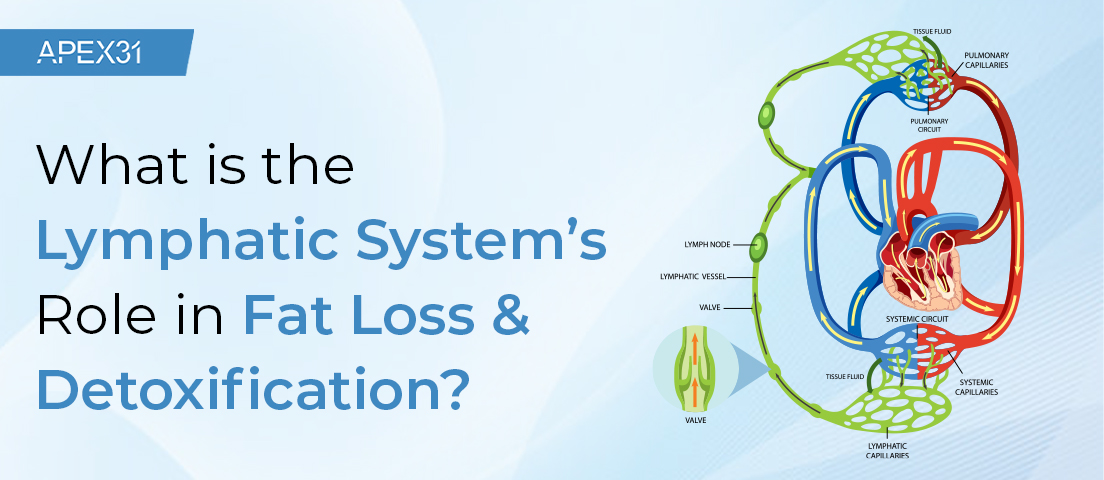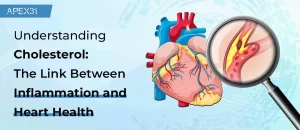What is the Lymphatic System’s Role in Fat Loss & Detoxification?

The lymphatic system is often overlooked as the circulatory or digestive systems are discussed a lot more. But you need to understand that the lymphatic system is a powerful orchestrator of our health. It is not just a drainage network but one of the most important components of our immune system.
This system plays a huge role in maintaining the fluid balance, absorbing fats, and even getting rid of harmful waste from the body. In fact, while pursuing optimal health and sustainable fat loss, knowing about the workings of the lymphatic system is quite important.
In this insightful and in-depth blog post, you will get to learn about the lymphatic system thoroughly. So, let’s begin!
Understanding the Lymphatic System’s Core Functionalities
The lymphatic system is a sophisticated internal cleansing network which plays a huge role in protecting your overall health. Its main function is to maintain the fluid balance, which involves collecting excess fluid, commonly known as lymph.
Without this regular collection and return of lymph to the bloodstream, the fluid will accumulate, which will lead to noticeable swelling and edema. Beyond the fluid management, the lymphatic system is the foundation of our immune defence. It acts as a transport highway for lymphocytes, white blood cells, and other immune components. This ensures that they can reach all parts of the body, which will be able to detect and combat infections.
Lymph nodes that are located along the lymphatic vessels function as vital filtration stations which will trap and neutralize harmful substances such as bacteria, viruses, and toxins even before they can re-enter general circulation. This role in fluid regulation and surveillance underscores why a healthy and efficient lymphatic system is important for maintaining your body’s internal system. Furthermore, it protects against illness, laying a great foundation for robust metabolic processes.
Lymphatic System’s Role in Fat Absorption
The digestive system breaks down fats, but it’s the lymphatic system which plays a unique and important role in their absorption and transport inside the body.
The small intestine has specialized lymphatic vessels, which are most commonly known as lacteals. These lacteals are specifically designed to absorb dietary fats and fat-soluble vitamins from the digestive tract directly. It’s not like carbohydrates and proteins, which enter the bloodstream directly from the intestine.
The large fat molecules, which once get emulsified and broken down into smaller components, are re-packaged into structures which are known as chylomicrons. These chylomicrons are too large to be absorbed directly into the tiny capillaries of the bloodstream. Instead, these are taken up by the lacteals and transported through the lymphatic system. From the lacteals, the chylomicrons travel through large lymphatic vessels, which enter the bloodstream near the heart. This lymphatic pathway will ensure that the fats bypass the liver, while the initial transport will allow them to be distributed throughout the body for energy.
How Lymphatic Drainage Aids Fat Metabolism?
The lymphatic system’s efficiency is in direct relation to how effectively our bodies are able to metabolize fat, especially during periods of weight loss. When the body starts breaking down the fat that is stored for energy, the resulting fatty acids and other metabolic byproducts need to be transported away from the fat cells and into the bloodstream, which will be used as fuel.
While the bloodstream takes care of this aspect, the lymphatic system provides a very important supplementary pathway that is used for larger lipid molecules and cellular debris, which can result from fat breakdown. Its proper drainage will ensure that these components are effectively moved through the system, which will prevent the accumulation in tissues.
A lymphatic system which isn’t working properly can slow down this clearance process, which will lead to a build-up of cellular waste and can even slow down the rate at which fat can be used. By ensuring a clear pathway for the broken-down fat components, a healthy lymphatic system will facilitate fat metabolism, allowing the body to not just access but burn its fat reserves as well.
The Inflammation-Fat Loss Connection: Lymphatic System as a Regulator
Chronic inflammation can sabotage your fat loss efforts considerably, and the lymphatic system plays a huge role in taking care of this process. Systematic inflammation can disrupt the crucial hormonal signals which govern fat storage and hunger, like insulin and leptin.
When the inflammation is rampant, cells can become a lot less responsive to insulin, which will lead to insulin resistance and fat storage. In a similar way, chronic inflammation can interfere with leptin signalling, which will tell the brain when the body has had sufficient fat reserves, which will lead to persistent hunger and overeating.
The lymphatic system, with its filtering and waste removal functions, can actively reduce this inflammatory burden. By clearing inflammatory mediators, toxins, and cellular debris from tissues, it will lower the overall inflammatory load on the body. This reduction in inflammation will allow the hormonal pathways to function in a much more optimum manner, which will restore the sensitivity to insulin and leptin. This will create a much more favourable environment for fat mobilization and loss.
Wrapping Up
The lymphatic system is an important pillar of our health, which is intricately woven into our immune defence, fluid balance, fat metabolism and detoxification processes. The efficient functioning is important for everything from the proper absorption of dietary fats to the clearance of inflammatory compounds, which can hamper the fat loss process. So, take care of your lymphatic system, and you are bound to get great rewards for your health.



